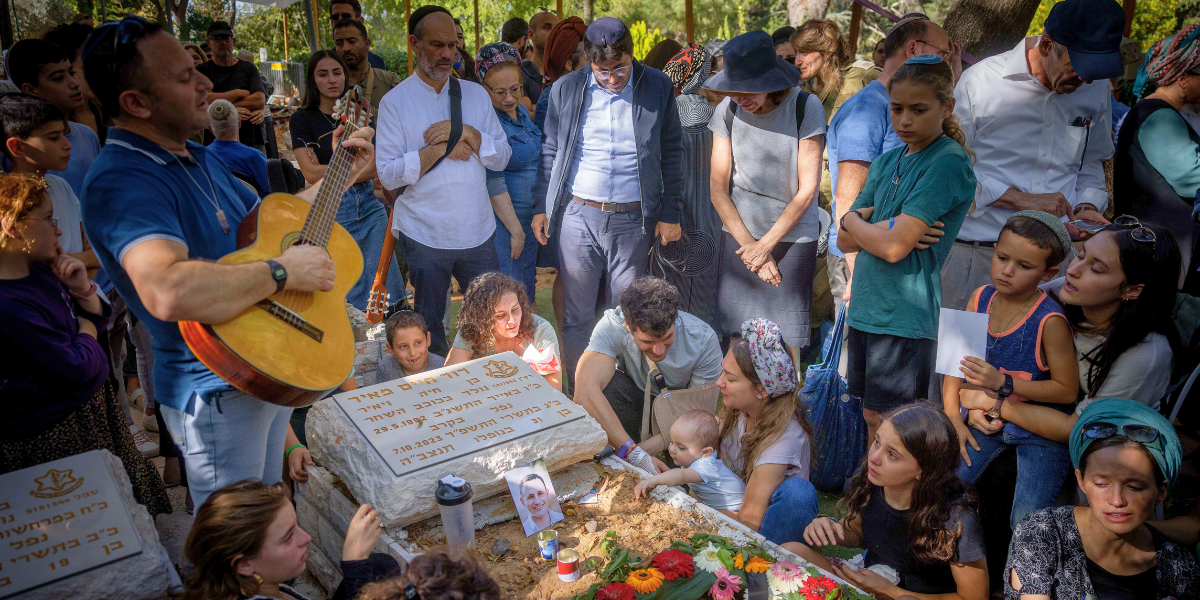Being Jewish
Commentary
Israel at 76: Mourn, Protest, Barbecue

Last year, we commemorated Israel’s 75th birthday as a national milestone. And yet, despite the accolades and events organized, it wasn’t the easiest moment to celebrate.
At the time, the country was several months into a stormy, complicated protest movement after having voted in one of the most right-wing governments in Israel’s history. The ruling coalition’s plan to overhaul the judicial system was met with some of the country’s largest-ever demonstrations as Israelis took to the streets to rally against what many saw as a move toward authoritarianism.
I was at those protests in my hometown of Jerusalem. My husband and I headed out every Saturday night, taking the furled Israeli flag attached to a bamboo pole from its space by the front hall closet. At the end of each demonstration, we sang “Hatikvah” with our flags held aloft, feeling, perhaps, that Israel’s national anthem represented a sense of hope that things could change.
As we observed Yom Hazikaron and Yom Ha’atzmaut, Israel’s Memorial Day and Independence Day, last May, we mourned and celebrated, never imagining that greater sadness, tension and madness lay ahead.
Following the terrifying Hamas attacks of October 7, when 1,200 people were killed and hundreds taken hostage, Israelis were in a state of shock. But it didn’t take long for many to begin gathering again, first in Tel Aviv in a public plaza that became known as Hostages Square. Every Saturday night, protesters would rally there to call attention to the plight of the hostages.
Those rallies spread across the country, as family members got up on stages to tell the crowds about their kidnapped loved ones, showing incredible strength in the face of an impossible situation.
By December, Israelis who remained frustrated with the government resumed their protests. They began calling for fresh leadership to help guide the country out of the morass of mourning and war. In April, according to a poll conducted by Israel’s Kan public broadcasting corporation, a combined 71 percent of Israelis said that Prime Minister Benjamin Netanyahu should resign, either immediately (42 percent) or just after the war ends (29 percent).
MAGAZINE DISCUSSION EVENT: Join us on Thursday, May 29 at 12:30 PM ET when we welcome journalists Ruth Marks Eglash, Uriel Heilman and Jessica Steinberg to discuss their experiences living in and covering Israel post-October 7.
Into April, those of us in Jerusalem who call for new elections would march slowly from the President’s Residence to Paris Square to attend a second rally for the hostages. There everyone would chant the names of the captives, alive or dead, and close the evening by again singing the national anthem.
What does “Hatikvah” mean now, in this time? To be, as the lyric claims, “a free people in our land, the land of Zion and Jerusalem”? Maybe. Or perhaps we’re singing just for the sake of the song’s name, for tikvah, a renewed sense of hope, especially after Israel and its allies successfully intercepted Iran’s missiles and drones launched at us during one early morning of fear in April.
As we approach the annual days of mourning and celebration for Israel’s independence, beginning with Yom Hazikaron on the evening of May 12, I’m anxiously anticipating the commemorations.
More than 600 soldiers have been killed since October 7, in addition to the 1,200 innocents massacred on that Black Saturday. That’s more than 1,800 families marking Yom Hazikaron at fresh gravesites in cemeteries all over Israel.
I recall the families I’ve interviewed for the far too many obituaries I’ve written, those whose loved ones were murdered at home in their kibbutz, shot while running for their lives at the Nova festival or killed trying to defend their families on October 7.
I think about Julie Bausi, whose son, Itai Bausi, was shot in the back and killed at the Nova festival after heroically coming to the aid of others. I think about Yuval Haran, who was at another music festival in Eilat when his father was murdered and his mother, sister, brother-in-law, niece and nephew, and aunt and cousin, were kidnapped from Kibbutz Be’eri and taken hostage to Gaza. All were returned in the hostage deal last November except his brother-in-law. How will they get through Memorial Day?
The point of the proximity of Israel’s Memorial Day and Independence Day on the calendar is that one morphs into the next. We attend somber remembrance ceremonies before moving slowly, carefully to barbecues and parties.
I’m not part of a bereaved family. I’ve never had to navigate that transition from personal grief to revelry. Yet this year, I feel the dichotomy of emotion keenly. How should we celebrate?
We’ll mourn and protest and barbecue, because we do things that feel familiar. And I will recall the words written by Naomi Shemer in her song “Lu Yehi (May It Be),” her ode to the Yom Kippur War:
Within a small, shaded neighborhood
Is a small house with a red roof
All that we ask for, may it be
This is the end of summer, the end of the path
Allow them to return safely here
All that we seek, may it be.
Jessica Steinberg is the longtime arts and culture editor for The Times of Israel. She pivoted to coverage of the hostages taken captive to Gaza by Hamas on October 7, speaking to their families, to those who have been released and covering their stories in articles and The Times of Israel’s Daily Briefing podcasts.








 Facebook
Facebook Instagram
Instagram Twitter
Twitter
Leave a Reply